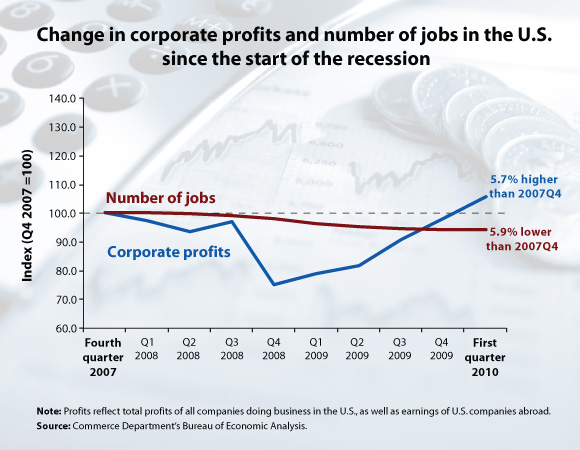Imagine the following scenario: it is late on Thursday afternoon. Your boss has just come in to talk with you about how much needs to be completed by Friday evening. Your department has only seven of the 10 employees that it had a year ago, but it has twice as much work because some tasks have been shifted from other departments to yours.
You are working well over 50 hours a week with no end in sight. You are tired, grumpy about the workload, and wondering if the recovery will ever mean more people to do the work, or at least a resumption of your previous pay that got cut 6 percent last year during one of the cost-cutting measures.
As you are finally driving home, you hear that the Fed released an economic report that morning that said that corporations were sitting on $1.8 trillion dollars in cash, but were not yet ready to commit to hiring or reinstating previous pay levels. It is all you can do not to drive off the road, swear out loud, plan some vile action, or just break down into tears.
The figure of company cash on hand is true. Here is the way it was described in a June Wall Street Journal article:
U.S. companies are holding more cash in the bank than at any point on record, underscoring persistent worries about financial markets and about the sustainability of the economic recovery. The Federal Reserve reported that non-financial companies had socked away $1.84 trillion in cash and other liquid assets as of the end of March, up 26 percent from a year earlier and the largest-ever increase in records going back to 1952.”
Here is the chart that shows what has happened to jobs and company reserves compliments of the Commerce Department’ Council on Economic Analysis:
Given the graphic above, it is easy to see why employees might be angry.
Money has substantially increased in organizations while jobs have declined. Employees hear those numbers, see these comparisons, and feel betrayed and under appreciated. They begin to wonder if they are getting a raw deal. They are grateful to have a job, but are also suffering from anxiety and huge amounts of uncertainty. And now they have reason to believe that they are being abused so that higher company profits can be achieved.
The effects of the work situations must also be addressed. Too much stress about job instability or overwork can lead to lack of motivation and concentration necessary to achieve accurate work. It can also threaten employee health and well-being.
In hard economic times, such as now, company demands can lead to mistakes, tension, marital troubles, strife at home; and all this can cause significant stress which leads to a variety of health issues.
So what’s the bottom line? Employers aren’t sure a real recovery has arrived because they aren’t seeing a significant increase in demand for their goods or services which results in them hoarding cash and being apprehensive to hire. Employees feel as though they can’t tolerate any more stress or uncertainty in their employment. The outcome: a disconnect between employees and their employer that is widening.
Employees hear numbers like $1.84 trillion in cash reserves and assume that their employer must have at least some of that. And if they do, then why haven’t some additional people been hired to handle the burgeoning workload? Why hasn’t pay been brought back to pre-recession levels?
This is a critical juncture for employers. Organizations that choose to communicate openly and fully with employees are likely to bridge this difficult time. Employers that neglect or avoid honest and forthright communication are likely to see employees depart as soon as it is feasible.
It is critical that employers talk with employees, explain what their specific situation is, and share with them what measures or criteria must be met before new employees can be hired or pay and benefits reinstated. If employees are told the truth about what their employer is facing, they can be more supportive and understanding.
Dealing with the unknown generates rumors, speculation, and mistrust. And those do no one any good!!